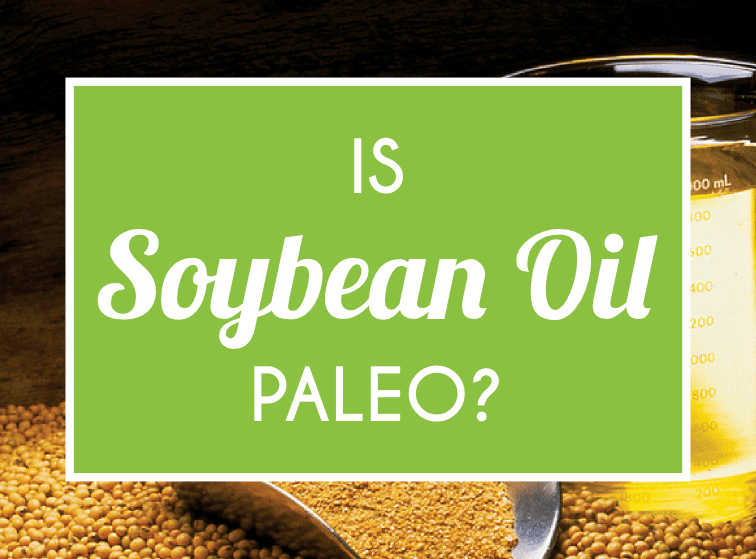The Quick Answer
No. Soybean oil is not paleo.
Table of Contents
Why Isn’t Soybean Oil Paleo?
Soybean oil is not paleo because it is made from soybeans (obviously), which are often very highly processed, GMO, disruptive to the body in many ways, and not paleo. Soybean oil does not provide enough health benefits to outweigh its harmful properties.
Soybean oil has the following break-down of fatty acids:
- 23% mono-unsaturated fats
- 58% poly-unsaturated fats
- 16% saturated fats
As you can see, soybean oil contains a high amount of PUFAs and a somewhat high amount of MUFAs. The good news about this is that its MUFAs could potentially be good for restoring cholesterol levels, however, the high PUFA content means it easily oxidizes and becomes rancid when it’s cooked at high heats (which it usually is). Because it’s cheap to buy and often misunderstood in terms of its health benefits, soybean oil is commonly used by restaurants and even home cooks to fry foods. But even if we put aside the unhealthy methods that are usually used with soybean oil, the oil itself is damaging in multiple ways.
Cooking unstable oils at high heats can cause them to become oxidized and rancid. Rancid oils can increase the number of free radicals in the body, which isn’t good news, because free radicals contribute to many problems – everything from widespread inflammation and arthritis to cancer. We aim to consume plenty of antioxidants to have the opposite effect on free radicals on the body, so we wouldn’t want to cancel out our hard work by introducing more free radicals into our bodies by using poor quality oils.
Hydrogenated Soybean Oils
Today roughly half of the soybean oil that is produced in the US is hydrogenated soybean oil. This oil is artificially hydrogenated to improve its shelf life. It becomes more stable and has a higher melting point when hydrogenated, which is useful for the manufacturers of the oil who wish to make it more appealing to customers, as well as more cost effective to make. The process of hydrogenating oil is, as you can probably guess, one that requires a lot of modern technology, chemical solvents, pesticides, and other nasty additives that no one should be consuming. Hydrogenation works by forcing hydrogen into the soybean oil molecules. This is done using very high heat processes that result in the oil taking a solid form.
Recently many nutrition authorities have warned the public against consuming hydrogenated oils like soybean oil because their research has shown them the many adverse health effects that processed hydrogenated oils have, including an increased risk of heart disease and stroke, disturbing thyroid function, inflammation, obesity, diabetes, and so on. However, hydrogenated soybean oil is still available in nearly all supermarkets and is commonly referred to in the media as a type of trans fat. Trans fats are thought to be some of the unhealthiest fats that can possibly be consumed.
Soy Is Almost Always Genetically Modified (GMO)
Another important reason why soybean oil should be avoided is that soy is one of the leading GMO foods produced today. It’s estimated that around 91% of the soy crops in the US are GMO, so it’s extremely likely that the beans used to make most processed soybean oils are genetically modified. They are also likely to contain pesticides. So when you consume soybean oil, not only are you ingesting something that was derived from genetically altered seeds, but you are also consuming added enzymes and harmful substances that are used in the manufacturing process of nearly all vegetable oils.
Some More Reasons To Avoid Soybean Oil
- All legumes, beans, and grains are common sources of specific toxins in our diets called aflatoxins. Aflatoxins can be found in soybean oils and all other soy products (tofu, miso, etc.).
- Soybeans also contain hormone and digestion disrupting lectins. Studies tell us that these lectins are harmful to the body because they are not digested very easily and because they can wind up leaking into the blood stream and sticking to the walls of cells and arteries, leading to problems like atherogenesis (clogged arteries).
- Additionally, soy beans contain estrogen-like molecules that are called isoflavones. These are known to be disruptive to hormone levels, especially when consumed in large of quantities or in processed forms like soybean oil.
- Because of certain chemical properties that soy products contain, like phytates, phytoestrogens, and lectins, soy is also thought to decrease the body’s ability to absorb certain nutrients.
For more information about soy and why it isn’t paleo, read these two articles: one and two.
Is There Any Confusion When It Comes To Soybean Oil Being Paleo?
No. Most paleo followers agree that both soybean oil and soy products in general are not paleo. It’s better to stick to oils that have less harmful side effects, as well as more benefits, like flaxseed, walnut, olive, macadamia, coconut, and avocado oils.
So Is Soybean Oil Paleo?
No. Soybean oil is not paleo. It is likely to oxidize when cooked and it contains a high number of carcinogens, toxins, hormone-disrupting molecules, and potentially disease-causing lectins, so soybean oil is not a good choice of fat on the paleo diet.
How To Know What Is And Isn’t Paleo
Check out Paleo.io, the mobile app that answers the question, “is __ paleo?” Paleo.io comes with the most comprehensive paleo diet food list out there, so no matter which food you’re confused about, you’ll always be able to find out whether or not it’s paleo.
Photo credit: United Soybean Board
Download Your FREE Paleo Starter Kit Today!
- 3-Day Paleo Diet Meal Plan
- Comprehensive Paleo Diet Shopping List
- 5 of Our Favorite Paleo Diet Recipes
